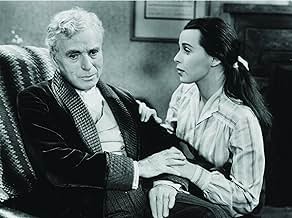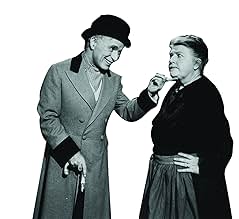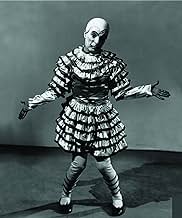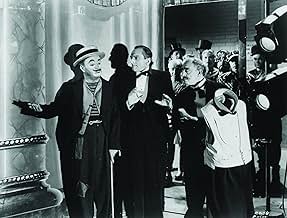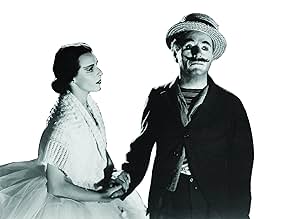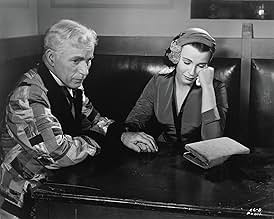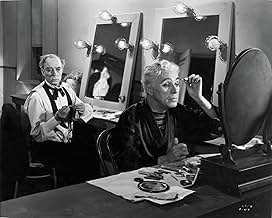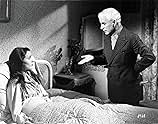ÉVALUATION IMDb
8,0/10
23 k
MA NOTE
Un comédien dépassé et une danseuse de ballet désespérée et suicidaire doivent s'unir pour trouver un but et de l'espoir dans leur vie.Un comédien dépassé et une danseuse de ballet désespérée et suicidaire doivent s'unir pour trouver un but et de l'espoir dans leur vie.Un comédien dépassé et une danseuse de ballet désespérée et suicidaire doivent s'unir pour trouver un but et de l'espoir dans leur vie.
- A remporté 1 oscar
- 7 victoires et 4 nominations au total
Molly Glessing
- Maid
- (as Mollie Glessing)
Leonard Mudie
- Dr. Blake - Calvero's Doctor
- (as Leonard Mudi)
'Snub' Pollard
- Street Musician
- (as Snub Pollard)
Billy Lee Aimone
- Little Boy
- (uncredited)
Avis en vedette
Charles Chaplin is, at least for me, the best film maker of all time. And Limelight is his best film. It is one of the 10 films I have given 100/100.
The film is about this old comedian who can't find himself a job. He saves a young girl who tried to commit suicide. Well, they become friends and stuff.
Simply the film is perfect. There is nothing bad I could say about it. Well, maybe the ballet scene was too long (but maybe I just can't concentrate enough). The script, the music, the actors, the whole philosophical structure of the film! They are all perfect. And the end of the film is something so beautiful that you really have to see it.
If there is one thing you have to see, make sure it'll be Chaplin's Limelight!
The film is about this old comedian who can't find himself a job. He saves a young girl who tried to commit suicide. Well, they become friends and stuff.
Simply the film is perfect. There is nothing bad I could say about it. Well, maybe the ballet scene was too long (but maybe I just can't concentrate enough). The script, the music, the actors, the whole philosophical structure of the film! They are all perfect. And the end of the film is something so beautiful that you really have to see it.
If there is one thing you have to see, make sure it'll be Chaplin's Limelight!
A washed-up, formerly-famous Music Hall comic, Charlie Chaplin, saves a suicidal ballerina, Claire Bloom. In the process of giving her the hope to move on and succeed, he regains the confidence to return to the stage himself.
"Limelight" is a moving and autobiographical film that works as both a bittersweet drama and a mirror into the soul of one of the world's greatest film makers. I sometimes wondered if my affection for this film is based on my knowledge of Chaplin's life and career, and the parallels between "Limelight" and people and incidents in his own life. When I watch this film I see an artist standing naked at a crossroads before his audience, unsure where to go and what to do. However, I know the film does not require an advanced degree in Chaplin to enjoy. My wife, who could probably do little more than identify the Tramp in a lineup before marrying me, loved this film before she met me. I have also had the good fortune to see the film in a theater in New York and watch it work its wonders on an audience. Stylistically, it might be dated, but the magic lingers.
"Limelight" is best viewed as a drama with comedy rather than a comedy with drama. Outwardly, it is the simple story of a vulnerable youth who mistakes her gratitude for love, and an older man wise enough to know the difference. But it's more than that too. It's about an artist's nature, and the addictive power of applause. The Chaplin character, Calvero, knows how to make people laugh, but feels he has lost the ability to do so. He realizes he is at the end of his career, but he still hungers for one final moment in the limelight. The film is talky and philosophical, and, yes, a little pompous and pretentious at times too. It's almost as if Chaplin is trying to impart through words the simple joys and mystery of life he was once able to express effortlessly through simple slapstick alone. Does this flood of words mean Chaplin has lost his skills as a film maker? No. He still has the power to move.
"Limelight" is Chaplin's final masterpiece. It is one of my favorites. I prefer to think of it as his last film. Should this be your first Chaplin film? No. Start with films like "The Gold Rush," "City Lights," and "The Great Dictator." Come to know the comedian before you get to know the man.
"Limelight" is a moving and autobiographical film that works as both a bittersweet drama and a mirror into the soul of one of the world's greatest film makers. I sometimes wondered if my affection for this film is based on my knowledge of Chaplin's life and career, and the parallels between "Limelight" and people and incidents in his own life. When I watch this film I see an artist standing naked at a crossroads before his audience, unsure where to go and what to do. However, I know the film does not require an advanced degree in Chaplin to enjoy. My wife, who could probably do little more than identify the Tramp in a lineup before marrying me, loved this film before she met me. I have also had the good fortune to see the film in a theater in New York and watch it work its wonders on an audience. Stylistically, it might be dated, but the magic lingers.
"Limelight" is best viewed as a drama with comedy rather than a comedy with drama. Outwardly, it is the simple story of a vulnerable youth who mistakes her gratitude for love, and an older man wise enough to know the difference. But it's more than that too. It's about an artist's nature, and the addictive power of applause. The Chaplin character, Calvero, knows how to make people laugh, but feels he has lost the ability to do so. He realizes he is at the end of his career, but he still hungers for one final moment in the limelight. The film is talky and philosophical, and, yes, a little pompous and pretentious at times too. It's almost as if Chaplin is trying to impart through words the simple joys and mystery of life he was once able to express effortlessly through simple slapstick alone. Does this flood of words mean Chaplin has lost his skills as a film maker? No. He still has the power to move.
"Limelight" is Chaplin's final masterpiece. It is one of my favorites. I prefer to think of it as his last film. Should this be your first Chaplin film? No. Start with films like "The Gold Rush," "City Lights," and "The Great Dictator." Come to know the comedian before you get to know the man.
Charlie Chaplin is one of the undisputed masters of the cinema. He was one of the funniest actors of the cinema, and he was also one of the greatest directors. Of course, the films that he is most famous for are his silent comedies, especially The Gold Rush, City Lights, and Modern Times. The latter two were the product of Chaplin's stubborn clinging to the format and conventions of the silent cinema, though everyone else had gone to sound. This stubbornness was certainly sound. His contemporaries such as Buster Keaton and Harold Lloyd lost popularity when they moved to sound. Chaplin's last two silent films were popular and made a lot of money. Audiences may have craved sound, but they craved Chaplin, too, and did not disdain his silence. He was one of the silent artists who thought that they were just achieving the peak of their medium when sound came in. He proved himself right, since City Lights (1931) and Modern Times (1936) are probably his two best films, and both are two of the best films ever made.
Finally, in 1940, Chaplin directed and starred in his first talkie, The Great Dictator. Three more followed, Monsieur Verdoux, then Limelight, then King of New York, which happens to be the only one of these four I have not seen. The Great Dictator and Monsieur Verdoux were both good films in their own way, but perhaps Chaplin's in depth political commentary in these films detracted from them. The type of comedy that you find in his silent films did not mix well with this social commentary. The simple juxtapositions of the worlds of the poor and the rich in City Lights and Modern Times were far more powerful than what his first two talkies had to offer.
Then came Limelight, one of the most bittersweet films ever made. It is not perfect, but it achieves a grand melodramatic beauty that few films have ever even approached. The story is simple: a washed-up, old vaudvillian rescues a young ballet dancer from suicide. He takes care of her until she is healthy again, and even restores her confidence. The story may be simple, but the character dynamics are very complex. As the dancer, Theresa, is recovering, Calvero is not only rebuilding her confidence, but also his own. Theresa, because of his kindness towards her, finally believes she has fallen in love with him, even going so far as proposing marriage to him. Whether she actually loves him or not, and Calvero strongly asserts that she shouldn't and doesn't, these two characters have a constantly evolving relationship that does not end until the credits role. It is utterly fascinating, captivating, and dramatic.
There are a couple of problems, and though they're small, they deserve attention. Perhaps the biggest problem is that Claire Bloom is quite guilty of overacting. Her line delivery is bizarre and overdramatic. This isn't a big deal, since you ought to be keenly aware that the film takes place in the world of melodrama, and is thus exaggerated. Another thing that irked me is Buster Keaton's role. It is little more than a cameo. In fact, his character doesn't even have a name in the credits. This is truly disappointing, seeing that he, although Chaplin may have had the most heart, was the all-around funniest silent comedian.
Finally, in 1940, Chaplin directed and starred in his first talkie, The Great Dictator. Three more followed, Monsieur Verdoux, then Limelight, then King of New York, which happens to be the only one of these four I have not seen. The Great Dictator and Monsieur Verdoux were both good films in their own way, but perhaps Chaplin's in depth political commentary in these films detracted from them. The type of comedy that you find in his silent films did not mix well with this social commentary. The simple juxtapositions of the worlds of the poor and the rich in City Lights and Modern Times were far more powerful than what his first two talkies had to offer.
Then came Limelight, one of the most bittersweet films ever made. It is not perfect, but it achieves a grand melodramatic beauty that few films have ever even approached. The story is simple: a washed-up, old vaudvillian rescues a young ballet dancer from suicide. He takes care of her until she is healthy again, and even restores her confidence. The story may be simple, but the character dynamics are very complex. As the dancer, Theresa, is recovering, Calvero is not only rebuilding her confidence, but also his own. Theresa, because of his kindness towards her, finally believes she has fallen in love with him, even going so far as proposing marriage to him. Whether she actually loves him or not, and Calvero strongly asserts that she shouldn't and doesn't, these two characters have a constantly evolving relationship that does not end until the credits role. It is utterly fascinating, captivating, and dramatic.
There are a couple of problems, and though they're small, they deserve attention. Perhaps the biggest problem is that Claire Bloom is quite guilty of overacting. Her line delivery is bizarre and overdramatic. This isn't a big deal, since you ought to be keenly aware that the film takes place in the world of melodrama, and is thus exaggerated. Another thing that irked me is Buster Keaton's role. It is little more than a cameo. In fact, his character doesn't even have a name in the credits. This is truly disappointing, seeing that he, although Chaplin may have had the most heart, was the all-around funniest silent comedian.
Charles Chaplin plays Calvero, an aging clown who rescues a ballet dancer called Terry (Claire Bloom) from committing suicide.These two become friends and Calvero gets more meaning to his life.He desperately tries to make a come back to become the greatest clown again but it's hard to make people laugh anymore.Limelight from 1952 was Charles Chaplin's last American film.It was a flop but the film won an Academy Award for best score in 1972.That year the king of comedy got also a special Oscar for career achievement.This was Chaplin's most sentimental movie and it also was very touching.Chaplin is amazing as the aging clown.The man wasn't only a great comedian.He was also a terrific actor.It's hard to top his performance in this movie.Claire Bloom's performance as the ballet dancer is also brilliant.Chaplin's son Sydney plays Neville in the movie.There are also Chaplin's children Victoria, Michael, Josephine, Geraldine and Charles Chaplin Jr. in this film.This is truly a masterpiece.This proves that Chaplin didn't shine only in silent movies.He did that also in talkies.And this is one of his best talkies. The dialogue is just delicious in this comedic drama.In the end you can see another great comedian from the silent era;Buster Keaton.You can see Chaplin and Keaton clowning together in the end.And that is one great scene.A scene to remember.The message of Limelight is how wonderful life is.Enjoy it while you still can.
Charles Chaplin stars as Calvero, an alcoholic, washed-up music hall comedian who saves a rooming house neighbor from committing suicide when he passes by her door and smells gas. The neighbor, young ballet dancer Thereza (Claire Bloom), attempted suicide because she believes that she will never walk and therefore never dance again. She stays with Calvero while she recuperates, and the old comic starts to improve himself as he sets out to get Thereza the chance to prove herself as a world-class dancer. Thereza wants to marry Calvero in spite of their large age difference (I won't go into how art is imitating life here), but he feels that a young composer (Sydney Earl Chaplin) would be a better match. Complications ensue.
Chaplin's last starring role came in this bittersweet drama, a massive hit everywhere else in the world, but barely released in the U. S. due to Chaplin being labeled a "dangerous leftist". I had the same opinion of this that I did with many of his silent movies: it's technically proficient, but the sentimentality is a bit too thick, and it often seems blatantly phony, and not earned by what has been shown on screen. I've grown to like many of Chaplin's films on repeat viewings, and even love a couple of them, but I've always preferred the work of Buster Keaton. It was nice seeing the two on screen together, but it wasn't for long enough. The movie eventually received an Oscar-qualifying premiere in L. A. twenty years later, and thus bizarrely won the 1972 Oscar for Best Score (Charles Chaplin, Ray Rasch, and Larry Russell).
Chaplin's last starring role came in this bittersweet drama, a massive hit everywhere else in the world, but barely released in the U. S. due to Chaplin being labeled a "dangerous leftist". I had the same opinion of this that I did with many of his silent movies: it's technically proficient, but the sentimentality is a bit too thick, and it often seems blatantly phony, and not earned by what has been shown on screen. I've grown to like many of Chaplin's films on repeat viewings, and even love a couple of them, but I've always preferred the work of Buster Keaton. It was nice seeing the two on screen together, but it wasn't for long enough. The movie eventually received an Oscar-qualifying premiere in L. A. twenty years later, and thus bizarrely won the 1972 Oscar for Best Score (Charles Chaplin, Ray Rasch, and Larry Russell).
Le saviez-vous
- AnecdotesThe Academy Award that Sir Charles Chaplin won for composing this film's score is the only competitive Oscar he ever received; his other awards were given to him for special achievement outside of the established categories.
- GaffesIn discussing the ballet with the cast, the dance director Bodalink casts a giant shadow in front of the auditorium seats (revealing it to be nothing more than a backdrop).
- Générique farfelu"The glamour of limelight, from which age must pass as youth enters."
- Autres versionsThe version of the film that premiered in London in 1952 ran 141 minutes. It had been in distribution for several months, when Charles Chaplin recalled film prints and deleted a scene in which Calvero leaves the sleeping Thereza, and goes to a bar, where he meets his old friend Claudius, the arm-less violin player, who gives Calvero money. The film ran 137 minutes after this scene was edited out for worldwide distribution. In the ending credits, there is still a billing for Stapleton Kent as Claudius, even though he is no longer seen in the film. The DVD includes the deleted scene as an extra feature.
- ConnexionsEdited into Histoire(s) du cinéma: Une histoire seule (1989)
Meilleurs choix
Connectez-vous pour évaluer et surveiller les recommandations personnalisées
- How long is Limelight?Propulsé par Alexa
Détails
- Date de sortie
- Pays d’origine
- Site officiel
- Langue
- Aussi connu sous le nom de
- Limelight
- Lieux de tournage
- société de production
- Consultez plus de crédits d'entreprise sur IMDbPro
Box-office
- Brut – à l'échelle mondiale
- 9 291 $ US
- Durée2 heures 17 minutes
- Couleur
- Rapport de forme
- 1.37 : 1
Contribuer à cette page
Suggérer une modification ou ajouter du contenu manquant



